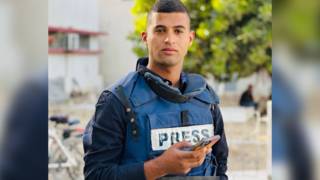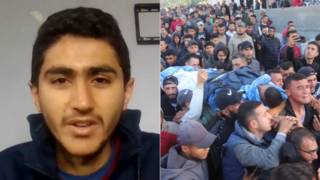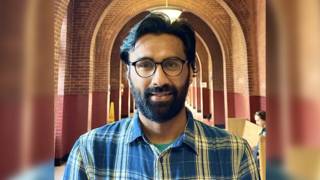
Guests
- Gershon BaskinMiddle East director of the International Communities Organization, a human rights advocacy group, and a frequent backchannel negotiator with Hamas.
- Tala Nasirlawyer with the Palestinian prisoner and human rights organization Addameer.
We continue our coverage of the long-awaited Gaza ceasefire by going to Jerusalem to speak with Israeli activist Gershon Baskin, who has experience negotiating with Hamas, including during this latest conflict. Baskin says while it’s heartening to see captives returning home, the ceasefire agreement is “a bad deal” because of how fragile it is. “Hamas would not have agreed to enter into this two- or three-phase deal without having guarantees … that in fact the war would end,” says Baskin. “But we don’t know that, because Netanyahu has given alternative promises to members of the government that Israel reserves the right to return to war.”
Transcript
AMY GOODMAN: Gershon Baskin, you’re in Jerusalem right now. If you could respond, overall, to how the ceasefire was achieved? Talk about the three Israeli women, as well as the 92 Palestinians who were released.
GERSHON BASKIN: Right. The ceasefire deal that was negotiated primarily in Doha over the last weeks happened because Donald Trump told Benjamin Netanyahu to make the deal now. He wanted this deal done before he entered the White House. The deal was actually almost the same deal that was presented by President Biden way back in May. And cynically, it wasn’t achieved until a day — a few days before January 20th, when Donald Trump takes the Oval Office. Steve Witkoff, the Middle East emissary of Donald Trump, worked hand in hand with Brett McGurk from the Biden administration to make sure that the deal was done in Doha. And as I said, it’s more or less the same deal that was presented back in May.
I have to comment. It is a bad deal. It is a bad deal for Israel. It’s a bad deal for the Palestinians. It’s a deal which will take months to implement and create a lot more suffering for the families, for the families of hostages, for the families of prisoners. And the chances of it derailing in the Gaza Strip are very high.
The three women who were released are Romi Gonen, 24 years old; Emily Damari, 28 years old; and Doron Steinbrecher, 31 years old. Two of them were from Kibbutz Kfar Aza, next to the Gaza Strip, and one of them was taken from the Nova festival on October 7th. They’re all civilians. None of them are military. None of them had anything to do with the Israeli occupation. They were Israeli citizens trying to live their lives.
AMY GOODMAN: And the Palestinians that were released, and then the additional, what, I think, 1,890 Palestinians who will be released, to underscore what Tala was just saying about the — well, they were all women and children, but the overall — the overwhelming majority had not been tried or charged.
GERSHON BASKIN: Yeah, I understand there are about a thousand administrative detainees who will be released in this first part of the deal for 33 of the Israeli hostages. Ninety-four hostages will remain in Gaza until the negotiations are completed on phase two, which will begin on day 16 and are supposed to be completed by day 30, before we enter another 42-week period. Hopefully, it will happen. Hopefully, the ceasefire will hold. And this is supposed to lead to an end to the war.
It seems to me that Hamas would not have agreed to enter into this two- or three-phase deal without having guarantees both from Qatar and from Egypt, through the United States, that in fact the war would end and will not continue beyond this first phase of the first 42 days. But we don’t know that, because Netanyahu has given alternative promises to members of the government that Israel reserves the right to return to war if the negotiations don’t end up moving in the direction that they want.
AMY GOODMAN: And the significance of Ben-Gvir, along with another MK, a member of Knesset, or known around the world as member of parliament — the significance of the far-right member of the Cabinet and member of the Knesset, Ben-Gvir, quitting?
GERSHON BASKIN: Right. Well, Ben-Gvir also admitted that he was successful in holding up this deal for months, which should be criminal. And he should be treated as criminal in the eyes of the Israeli public. I started by saying that this is a bad deal, but a bad deal is better than no deal. Certainly, Ben-Gvir’s resignation from the Cabinet and not being our minister for national security is a cherry on the cake that was unexpected. And it certainly made the deal a little bit sweeter for us Israelis who would like to live in a normal country. Ben-Gvir is a danger to our society. He’s a danger to our democracy. I think he’s a danger to the entire region. And the further away he is from power, the better it is for all of us.
AMY GOODMAN: Does he remain in the parliament, in the Knesset, or just quit as a Cabinet member?
GERSHON BASKIN: He just quits as a Cabinet member. He remains in the parliament. But a number of the parliamentarians from his party became members of parliament in what’s called the Norwegian [Law] here. When ministers enter the government, they can resign their Knesset seat, their parliament seat, and bring in additional people from the party. Apparently, two of the members of his party now have to also be removed from the Knesset, which is also a blessing.
AMY GOODMAN: And Bezalel Smotrich did, ultimately, though he threatened to leave, remain.
GERSHON BASKIN: Yeah, he remained. He cynically put out a tweet on X congratulating the return of the hostages, that he tried to block. He voted against the deal. There is no end to the cynicism within the Israeli government.
AMY GOODMAN: Tala, if you can talk about the release of Khalida Jarrar, a Palestinian parliamentarian, a member of the PFLP, the Popular Front for the Liberation of Palestine?
TALA NASIR: Yes. So, Khalida was released also yesterday. She was completely isolated from the outside world for four — five months now. She was released with a horrible — in a horrible condition, actually, because of the isolation, because of the starvation imposed at least her and other women prisoners, because of the lack of personal hygiene tools, the confiscation of clothes and electrical appliances, the denial of medical care. So, she was released in a very horrible situation. And people around the world saw the pictures of how she was released. And it’s not only about Khalida Jarrar, but it’s also other women prisoners who were also released in a very bad situation. And they were subjected to different torture and ill-treatment methods, which led to them lose so much of their weight. They were starving inside the prisons, and that’s why we saw them in this horrible situation.
AMY GOODMAN: I want to thank you both for being with us. Of course, we will continue to follow this extremely closely. Tala Nasir is lawyer with Addameer, the Palestinian prisoners organization. She’s speaking to us from Ramallah in the occupied West Bank. And Gershon Baskin, longtime backchannel negotiator with Hamas in ceasefire deals.
Up next, ahead of Donald Trump’s second inauguration as president, thousands marched in protest Saturday across the United States. We’ll hear voices from the People’s March in Washington, D.C., then to Angela Davis at the Inaugural Peace Ball. Stay with us.
[break]
AMY GOODMAN: “Mawtini (My Homeland)” sung by journalists in Gaza, one year after they first recorded in the midst of Israel’s attacks. The song is based on a poem by the Palestinian poet Ibrahim Tuqan from 1934.











Media Options